| Srl | Item |
| 1 |
ID:
139406
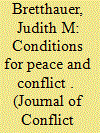

|
|
|
|
|
| Summary/Abstract |
This study applies fuzzy-set Qualitative Comparative Analysis (fsQCA) to the debate on links between resource scarcity and armed conflict. Previous studies on this relationship have reached contradictory results. This study aims to solve this contradiction by arguing that social, economic, and political conditions play an important role in determining whether armed conflict erupts over resource scarcity. I test three theoretic hypotheses, focusing on weak states, economic situations of households, and human ingenuity. I compare fifteen resource scarce cases with conflict to sixteen cases without armed conflict. My analysis supports the hypothesis that the economic situation of households and the levels of human ingenuity matter. In particular, the impact of high dependence on agriculture and low levels of tertiary education on the link between resource scarcity and conflict is discussed. While employing an fsQCA proves a valuable step in accounting for contradictory results, limits of the methods are apparent as well.
|
|
|
|
|
|
|
|
|
|
|
|
|
|
|
|
| 2 |
ID:
139408
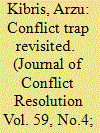

|
|
|
|
|
| Summary/Abstract |
This article analyzes the association between civil conflicts and educational achievement by studying the Turkish case. It combines the 2005 university entrance exam scores of more than 1.6 million students and a newly constructed data set on the casualties of the Turkish–Kurdish conflict to study the association between the conflict and educational achievement of Turkish students. The results reveal a significant negative association. Combined with the already well-established positive links between education and various measures of socioeconomic development like economic growth, social equality, and public health, the results in this article demonstrate that education is one of the channels through which civil conflicts damage the well-being of societies thereby creating the conditions that perpetuate them.
|
|
|
|
|
|
|
|
|
|
|
|
|
|
|
|
| 3 |
ID:
139409
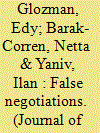

|
|
|
|
|
| Summary/Abstract |
The usual purpose of negotiations is to explore options and reach an agreement, if possible. We investigated a notable exception to this generalization, where a party negotiates without any intention of reaching an agreement. False negotiation occurs when a party gains more by stalling the negotiations until an external change takes place that improves its position considerably. While false negotiators aim to avoid agreement within the current frame of the negotiations, they also aim to keep the negotiation process alive, since walking away from the negotiation table could endanger their position. We report the results of a study that compared the actions of false and sincere negotiators. The false negotiators used competitive tactics that encumbered the negotiations, yet they concealed their intentions by maintaining a facade of cooperation. Our theoretical discussion is focused on the balancing act involved in false negotiations and the challenges it poses for actors in social, managerial, and political settings. We conclude our analysis with an example from the realm of international negotiations.
|
|
|
|
|
|
|
|
|
|
|
|
|
|
|
|
| 4 |
ID:
139405


|
|
|
|
|
| Publication |
Jul 11, 2005.
|
| Summary/Abstract |
Important gaps remain in the understanding of the economic consequences of civil war. Focusing on the conflict in Rwanda in the early 1990s, and using micro data, this article finds that households and localities that experienced more intense conflict are lagging behind in terms of consumption six years after the conflict, a finding that is robust to taking into account the endogeneity of violence. Significantly different returns to land and labor are observed between zones that experienced low- and high-intensity conflict which is consistent with the ongoing recovery. Distinguishing between civil war and genocide, the findings also provide evidence that these returns, and by implication the process of recovery, depend on the form of violence.
|
|
|
|
|
|
|
|
|
|
|
|
|
|
|
|
| 5 |
ID:
139410
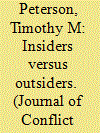

|
|
|
|
|
| Summary/Abstract |
A growing literature examines the link between preferential trade agreements (PTAs) and peace among member states. However, despite the potentially competitive nature of these agreements, there has been little research examining whether and how PTAs could induce hostilities between members and nonmembers. In this article, I argue that dyadic conflict is more likely when one dyad member’s exclusive PTA with a third party results in lower exports for the dyad member that is excluded from the agreement. Importantly, I contend that trade creating as well as trade diverting PTAs can have this effect. I use a triadic extension of the gravity model of trade to estimate how an exclusive PTA influences the exports of nonmembers relative to PTA members. Using these estimates in statistical tests of dyadic militarized interstate dispute onset spanning 1961 to 2000, I find that PTA-induced trade distortions are associated with a higher likelihood of conflict between members and nonmembers.
|
|
|
|
|
|
|
|
|
|
|
|
|
|
|
|
| 6 |
ID:
139407
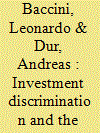

|
|
|
|
|
| Summary/Abstract |
The proliferation of bilateral and regional trade agreements has arguably been the main change to the international trading system since the end of the Uruguay Round in the mid-1990s. We argue that investment discrimination plays a major role in this development. Preferential trade agreements can lead to investment discrimination because of tariff differentials on intermediary products and as a result of provisions that relax investment rules for the parties to the agreement. Excluded countries are sensitive to the costs that this investment discrimination imposes on domestic firms and react by signing a trade agreement that aims at leveling the playing field. We test our argument using a spatial econometric model and a newly compiled data set that includes 166 countries and covers a period of eighteen years (1990–2007). Our findings strongly support the argument that investment discrimination is a major driver of the proliferation of trade agreements.
|
|
|
|
|
|
|
|
|
|
|
|
|
|
|
|